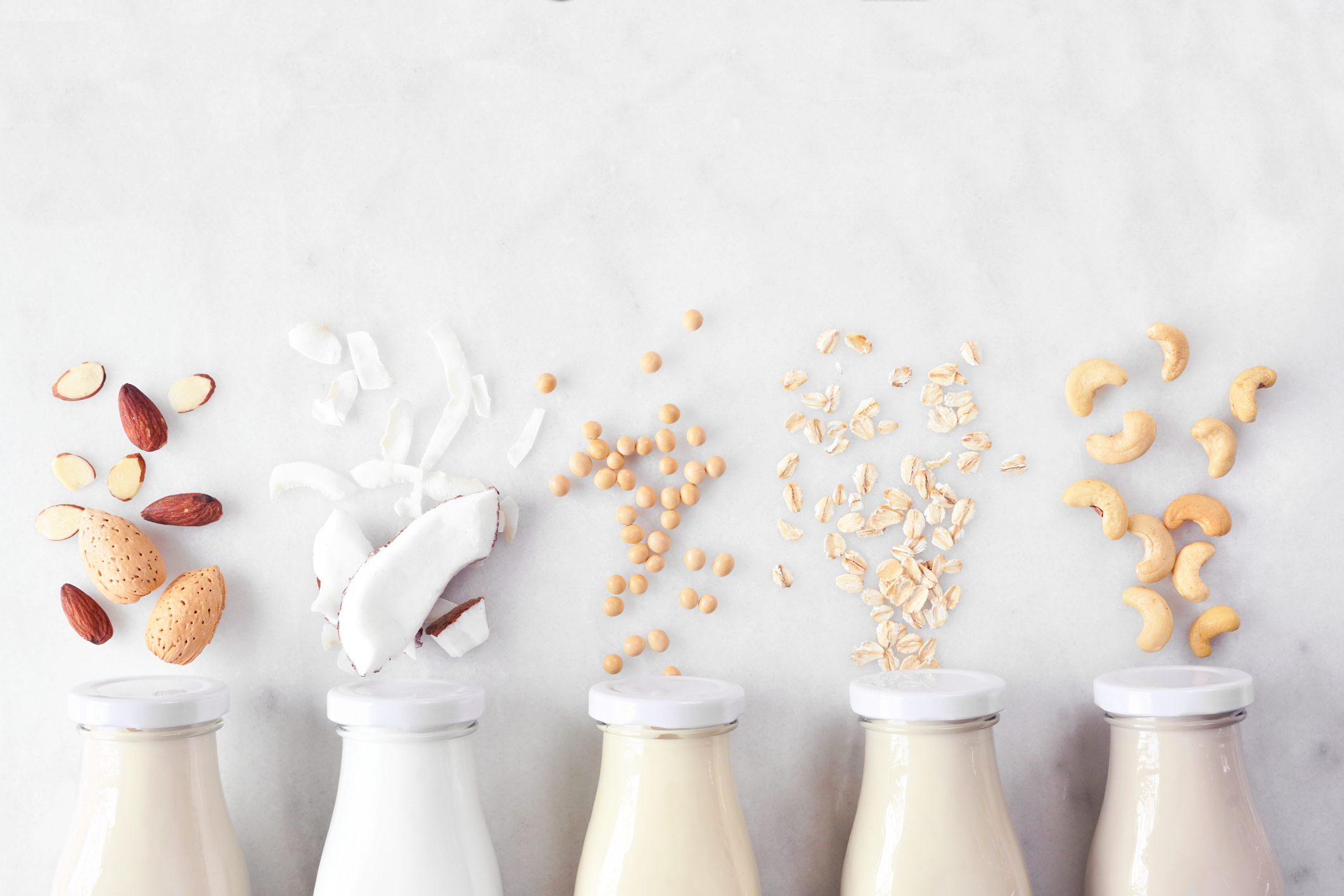For many years, soy milk was the biggest contender for replacing dairy. Twenty years ago, I would peruse the milk aisle and find a few options dispersed among endless brands of cow’s milk. But soy milk has its own problems, and I’ve never recommended it as a dairy substitute.
These day’s you’ll find plenty of varieties of plant-based milks that are soy-free and made from nuts, seeds, legumes, and oats.
Yes, compared with plant-based milks, cow’s milk still sells the most.( In 2021, plant-based milks accounted for 16% of all retail milk sales.)1 But 70% of the world’s population is lactose intolerant,2 and cow's milk has lots of other problems. My verdict: stay far, far away from cow's milk and all other forms of dairy.
How Is Plant-Based Milk Made?
While manufacturing strategies vary, plant-based milks are usually made by soaking the nut, seed, or other plant in water for several hours or overnight, which softens them. Soaking also removes enzyme inhibitors, which improves nutrient digestibility and availability.
Manufacturers then blend that base with filtered water to create a smooth, creamy texture. The ratio of plant to water varies, but usually ranges from 1:3 or 1:4. (In other words, one part plant to three or four parts water.)
The blended mixture is then strained through a nut-milk bag or cheesecloth to remove any solids. The result can be thin and watery, so manufacturers often add thickeners to provide a smoother, creamier texture.
While I can’t possibly account for the many varieties and blends available today, I evaluated six popular varieties of unsweetened plant-based milks readily available at most supermarkets. Even though I've provided numbers, actual nutrition information can vary among brands. From my research, here’s what I learned about the best plant-based milk choices.
Almond Milk
Almond milk has a mild, slightly nutty flavor, with a smooth, creamy texture like dairy milk. While flavors can differ depending on varieties, almond milk has a slightly sweet taste (even among unsweetened types).
Nutrition-wise, an eight-ounce glass of unsweetened almond milk contains:
- 30 calories
- 2.5 grams of total fat
- 1 gram of protein
- 1 gram of carbohydrate
Eight ounces of unsweetened almond milk also offers excellent amounts of vitamin E and vitamin A, along with calcium and vitamin D and small amounts of minerals like magnesium and potassium. While not listed on the container, most almond and other plant-based milks contain about half of the recommended daily allowance for vitamin B12.3
Take home: Unsweetened almond milk is a great dairy alternative that has a pleasant flavor and will appeal to almost everyone. If you’re looking for a “starter” plant-based milk, this is a good choice. You can find unsweetened almond milk in most grocery stores.
Cashew Milk
Cashew milk also has a slightly nutty flavor, and its natural fat tends to give the milk a creamier texture. An eight-ounce glass of unsweetened cashew milk contains:
- 25 calories
- 2 grams total fat
- 1 gram carbohydrate
- 0 grams fiber
- Less than one gram of protein
Cashew milk also offers small amounts of vitamin D, calcium, iron, potassium, vitamin A, and vitamin E.
Take home: Cashew milk is a newer player in the plant-based milk market. It’s lower in calories than other plant-based milks, providing a pleasant flavor and smooth texture. If you use almond milk but want to mix things up, unsweetened cashew milk is a great choice.
Coconut Milk
Coconut milk comes from the flesh of mature coconuts. You’ll find coconut milk in Southeast Asia and Caribbean cuisines, but it’s also become a popular substitute for cow’s milk.
Coconut milk comes in cartons and cans. Canned varieties (especially full-fat ones) are concentrated, so you’ll need to dilute with filtered water. I recommend blending one serving size (about 1/8 of the can) with two parts water. Cartons blend coconut milk or coconut cream with water, so there’s no need to dilute.
An eight-ounce glass of unsweetened carton coconut milk contains:
- 45 calories
- 5 grams total fat
- 1 gram carbohydrate
- 0 grams fiber
- 0 grams protein
Coconut milk is a good source of calcium, iron, and potassium. Carton types usually include other nutrients, including vitamin D and zinc.
The fat in coconut milk is saturated, mostly from fatty acids called medium-chain triglycerides (MCTs). The structure of MCTs makes them easier to metabolize, and your body is more likely to burn than store those fats. Most of that fat comes from healthy lauric acid, which may protect your immune system.4
Take home: Every few years, some expert or study comes out arguing that coconut is unhealthy. Most of their criticism stems from saturated fat. Unfortunately, those experts don’t differentiate between the unhealthy saturated fats in, say, a fast-food cheeseburger and the healthy ones in coconut. In this episode, I discuss coconut’s health benefits. I also use coconut milk in many recipes, including this super-yummy coconut ice cream.
Hemp Milk
Hemp milk comes from the small, brown seeds of the hemp plant. This beverage has a slightly nutty flavor and may also have a greenish hue due to the natural plant oils in hemp seeds.
An eight-ounce glass of unsweetened hemp milk contains:
- 60 calories
- 4.5 grams fat
- 0 grams carbs
- 0 grams fiber
- 3 grams protein
Hemp milk also includes good amounts of vitamin D, calcium, potassium, and magnesium.
Take home: Hemp milk is slightly higher in fat (and calories) compared to other plant-based milks. Some of that fat comes from alpha-linolenic acid (ALA), an anti-inflammatory omega-3 fatty acid. Hemp milk contains a tiny bit of protein. Some people describe hemp milk as nutty, creamy, or sweet. Others may detect a grassy or herbaceous taste. This will depend on the brand, variety, and your taste buds.
Flax Milk
Flax milk has a mild flavor. Some say it tastes like almond milk, while others may detect a slightly earthy taste (due to the natural oils in flax seeds).
An eight-ounce glass of unsweetened flax milk contains:
- 25 calories
- 2.5 grams fat
- 1 gram carbohydrate
- 0 grams fiber
- 0 grams protein
Flax milk also contains small amounts of vitamin D, vitamin A, vitamin B12, phosphorus, and calcium.
Take home: Flax milk is another great source of the anti-inflammatory omega-3 fatty acid ALA. In fact, one serving of flax milk contains an impressive 1,200 mg of omega-3s. Flavor depends on the manufacturer as well as your taste buds. Some people describe flax milk as smooth and creamy, with a slightly thinner consistency than cow’s milk. Others find flax milk slightly sweeter or earthier than other milk alternatives.
Oat Milk
Oat milk came roaring onto the scene a few years ago, and its clever marketing put it firmly on the plant-based milk map. Made from whole oats and water, oat milk has a creamy texture and a mild, slightly sweet taste that makes it ideal for cooking, baking, and in coffee or loaded smoothies.
An eight-ounce glass of unsweetened oat milk contains:
- 45 calories
- 0.5 grams total fat
- 8 grams carbohydrate
- 1 gram fiber
- 1 gram protein
Oat milk also contains small amounts of vitamin D, calcium, iron, potassium, vitamin A, riboflavin, and vitamin B12.
Take home: While oats are gluten-free, they can sometimes become cross-contaminated with gluten during manufacturing. Always look for certified gluten-free oat milk. Be aware that some brands use nasty inflammatory oils, such as rapeseed oil. Avoid them like the plague!
Finding the Best Plant-Based Milks
While they vary in nutrition, taste, and availability, none of the unsweetened plant-based milks I looked at were bad. I prefer those that have some protein and healthy fats, such as hemp or flax milk.
Nutrition is important, but taste matters, too. If you’re a newbie, I’ve found that almond milk or cashew milk has the mildest, most pleasant taste. Coconut milk is also great: slightly sweet, loaded with healthy fats, but not overpowering.
One thing many plant-based milks lack is protein. That’s why I’m a huge fan of Good Karma Unsweetened Flaxmilk + Protein: an eight-ounce glass also gives you eight grams of pea protein along with the benefits of flax milk, including anti-inflammatory ALA. It’s a staple of my loaded smoothies.
Whatever choice you make, never mind what the front label says: read the ingredients very, very closely. Many plant-based milks contain thickeners and other additives for consistency, texture, and flavor, including organic guar gums. They’re fine in very small amounts.
Some other strategies when you’re deciding on plant-based milks:
- Only choose unsweetened varieties. Some sweetened plant-based milks can contain as much sugar as cola, knocking down their health credibility. I only looked at unsweetened varieties that contained no added sugars.
- Choose organic varieties. Nuts and seeds (including coconut) are high in fat. When conventional types are sprayed with pesticides and other chemicals, they easily absorb those toxins, which end up in your milk. Buying organic ensures that you don’t get that chemical overload!
- Nutrition consistency isn’t perfect. ConsumerLab.com tested a variety of plant-based milks to validate their claims. Most passed the test, providing the nutrients they promise. But they found one hemp milk contained less calcium and more vitamins than it listed.5
One final pet peeve: every plant-based carton I looked at contained inferior forms of nutrients, including zinc oxide and vitamin D as vitamin D2. While vitamin D2 is vegan, studies show that vitamin D3 raises blood levels much better. Researchers have even gone so far to say that “vitamin D2 should not be regarded anymore as suitable for supplementation or fortification.”6 (Plant-based milk manufacturers, if you’re reading this: step up your game with the added nutrients!)
Cost-wise, plant-based milks can be two to three times more than cow’s milk. If coconut milk is your go-to, buying full-fat canned coconut milk and diluting it can save you money.
Alternatively, make your own plant-based milk. Besides the savings, you reduce the environmental impact of buying containers, plus you’ll know exactly what goes into your beverage.
Here’s a simple way to make one:
Ingredients
- 1 cup of your chosen plant-based ingredient (almonds, cashews, oats, etc.)
- 4 cups of filtered water
- Optional sweeteners or flavorings (including stevia or other approved sweeteners, real vanilla extract, raw cacao powder)
Instructions:
- Soak your chosen plant-based ingredient in water overnight. This softens the ingredients and makes them easier to blend.
- Drain the soaked ingredient and rinse well.
- Add the soaked ingredient and 4 cups of filtered water to a blender.
- Blend the mixture on high speed, until the mixture is smooth and creamy.
- Strain the mixture through a nut-milk bag or cheesecloth to remove any remaining solids.
- Add approved sweeteners or flavorings to taste.
- Store in an airtight container in your fridge for up to 5 days.
That's it! You now have homemade, plant-based milk. And you know exactly what's gone into it.
My favorite way to enjoy plant-based milks is in a fast, filling loaded smoothie. Need some yummy ideas? I’ve got over 60 recipes in this guide. It’s FREE… and guaranteed to be a game-changer for fat loss and overall health. Download yours here.
References:
- Plant Based Foods Assocation: U.S. plant-based food retail sales hit $7.4 billion, outpacing total retail sales, despite supply chain interruptions and pandemic restrictions creating widespread volatility in the food industry
- Ugidos-Rodríguez S, Matallana-González MC, Sánchez-Mata MC. Lactose malabsorption and intolerance: a review. Food Funct. 2018 Aug 15;9(8):4056-4068. doi: 10.1039/c8fo00555a. PMID: 29999504.
- ConsumerLab.com.® Plant-Based Milks Review
- Bowden, Jonny. The 150 Healthiest Foods on Earth: The Surprising, Unbiased Truth about What You Should Eat and Why (p. 108). Creative Publishing International. Kindle Edition.
- ConsumerLab.com: Plant-Based Milks Review (Almond, Cashew, Coconut, Flax, Hemp, Macadamia, Oat, Pea, and Soy)
- Mistretta VI, Delanaye P, Chapelle JP, Souberbielle JC, Cavalier E. Vitamine D2 ou vitamine D3? [Vitamin D2 or vitamin D3?]. Rev Med Interne. 2008 Oct;29(10):815-20. French. doi: 10.1016/j.revmed.2008.03.003. Epub 2008 Apr 11. PMID: 18406498.
*These statements have not been evaluated by the Food & Drug Administration. Products mentioned are not intended to diagnose, treat, cure, or prevent any disease. The views in this blog by JJ Virgin should never be used as a substitute for professional medical advice. Please work with a healthcare practitioner concerning any medical problem or concern.






